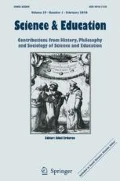Abstract
We can distinguish the claims of cognitive constructivism from those of metaphysical constructivism, which is almost entirely irrelevant to science education. Cognitive constructivism has strong empirical support and indicates important directions for changing science instruction. It implies that teachers need to be cognizant of representational, motivational and epistemic dimensions which can restrict or promote student learning. The resulting set of tasks for a science teacher are considerably larger and more complex than on the older more traditional conception, but the resources of cognitive sciences and the history of science can provide important parts of the teachers intellectual tool kit. A critical part of this conception of science education is that students must develop the skills to participate in epistemic interchanges. They must be provided opportunities and materials to develop those skills and the classroom community must have the appropriate features of an objective epistemic community.
Similar content being viewed by others
REFERENCES
Ackermann, R.J.: 1985, Data, Instruments, and Theory: A Dialectical Approach to Understanding Science, Princeton University Press, Princeton.
Aikenhead, G.: 1992, ‘How to Teach the Epistemology and Sociology of Science in a Historical Context’, in S. Hills (ed.), Second International HPS&ST Proceedings, University of Kingston, Kingston, pp. 23–34.
Ames, C.A.: 1990, ‘Motivation: What Teachers Need to Know’, Teachers College Record 91, 409–421.
Bloom, J.: 1992, ‘Contextual Flexibility: Learning and Change from Cognitive, Sociocultural and Physical Context Perspectives’, in S. Hills (ed.), Second International HPS&ST Proceedings, University of Kingston, Kingston, pp. 115–126.
Bruer, J.T.: 1993, Schools for Thought: A Science of Learning in the Classroom, MIT Press, Cambridge.
Cartwright, N.: 1983, How the Laws of Physics Lie, Clarendon Press, Oxford.
Chinn, C. & Brewer, W.: 1993, ‘The Role of Anomalous Data in Knowledge Acquisition: A Theoretical Framework and Implications for Science Instruction’, Review of Ed Research 63, 1–50.
Cobb, P.: 1994a, ‘Constructivism in Mathematics and Science Education’, Educational Researcher 23, 4.
Cobb, P.: 1994b, ‘Where Is the Mind? Constructivist and Sociocultural Perspectives on Mathematical Development’, Educational Researcher 23, 13–23.
Driver, R. et al.: 1994, ‘Constructing Scientific Knowledge in the Classroom’, Educational Researcher 23, 5–12.
Duschl, R.A. & Feather, R.: 1995, ‘Developing and Nurturing Objectivity in Science Classrooms’, in Proceedings of the Third International Conference on History and Philosophy of Science and Science Teaching, University of Minnesota Press, Minneapolis, MI, pp. 314–325, Vol. 1.
Duschl, R.A.: 1990, Restructuring Science Education: The Importance of Theories and Their Development, Columbia University Press, New York.
Fosnot, C.: 1993, ‘Rethinking Science Education: A Defense of Piagetian Constructivism’, Journal of Research in Science Teaching, 30(9), 1189–1201.
Giannetto, E.: 1992, ‘The Relations Between Epistemology, History of Science and Science Teaching from the Point of View of the Research on Mental Representations’, in S. Hills (ed.), Second International HPS&ST Proceedings. University of Kingston, Kingston, pp. 359–374.
Giere, R.: 1989, ‘The Units of Analysis in Science Studies’, in S. Fuller et al. (eds.), The Cognitive Turn, Kluwer Academic Publishers, Dordrecht, pp. 3–11.
Giere, R.: 1988, Explaining Science: A Cognitive Approach, University of Chicago Press, Chicago, IL.
Gil-Perez, D.: 1992, ‘Approaching Pupil's Learning to Scientific Construction of Knowledge: Some Implications of the History and Philosophy of Science in Science Teaching’, in S. Hills (ed.), Second International HPS&ST Proceedings, University of Kingston, Kingston, pp. 375–390.
Glasson, G. et al.: 1992, ‘Social Constructivism in Science Learning: Toward a Mind-World Synthesis’, in S. Hills (ed.), Second International HPS&ST Proceedings, University of Kingston, Kingston, pp. 399–406.
Goldin, G.: 1990, ‘Epistemology, Constructivism, and Discovery Learning in Mathematics’, in R.B. Davis, C. Maher & N. Noddings (eds.), Constructivist Views on The Teaching and Learning of Mathematics, NCTM, pp. 31–47.
Longino, H.: 1992, ‘Essential Tensions — Phase Two: Feminist, Philosophical and Social Studies of Science’, in E. McMullin (ed.), The Social Dimensions of Science, U Notre Dame Press, Notre Dame, IN. pp. 198–216.
Longino, H.: 1994, ‘The Fate of Knowledge in Social Theories of Science’, in F.F. Schmitt (ed.), Socializing Epistemology: The Social Dimensions of Knowledge. Rowman & Little-field, Lanham, Maryland, pp. 135–157.
Matthews, M. & Davson-Galle, P.: 1992, ‘Constructivism and Science Education: Some Cautions and Comments’, in S. Hills (ed.), Second International HPS&ST Proceedings, University of Kingston, Kingston, pp. 135–144.
Matthews, M.: 1994, Science Teaching: The Role of History and Philosophy of Science, Routledge, New York.
Megill, A.: 1991, ‘Four Senses of Objectivity’, Annals of Scholarship 8, 301–320.
Nieddcrer, H.: 1992, ‘Science Philosophy, Science History and the Teaching of Physics’, in S. Hills (ed.), Second International HPS&ST Proceedings, University of Kingston, Kingston, pp. 201–214.
O'Loughlin, M.: 1993, ‘Some Further Questions for Piagetian Constructivists: A Reply to Bosnot’. Journal of Research in Science Teaching 30(9), 1203–1207
O'Loughlin, M.: 1992, ‘Rethinking Science Education: Beyond Piagetian Constructivism Toward a Sociocultural Model of Teaching and Learning’, Journal of Research in Science Teaching 29(8), 791–820.
Von Glasersfeld, E.: 1992, ‘A Constructivist Approach to Experimential Foundations of Mathematical Concepts’, in S. Hills (ed.), Second International HPS&ST Proceedings. University of Kingston, Kingston, pp. 553–572.
Von Glasersfeld, E.: 1990, ‘An Exposition of Constructivism: Why Some Like it Radical’, in R.B. Davis, C. Maher & N. Noddings (eds.), Constructivist Views on The Teaching and Learning of Mathematics, NCTM, Reston VA, pp. 19–30.
Author information
Authors and Affiliations
Rights and permissions
About this article
Cite this article
Grandy, R.E. Constructivisms and Objectivity: Disentangling Metaphysics from Pedagogy. Science & Education 6, 43–53 (1997). https://doi.org/10.1023/A:1008665913766
Published:
Issue Date:
DOI: https://doi.org/10.1023/A:1008665913766


